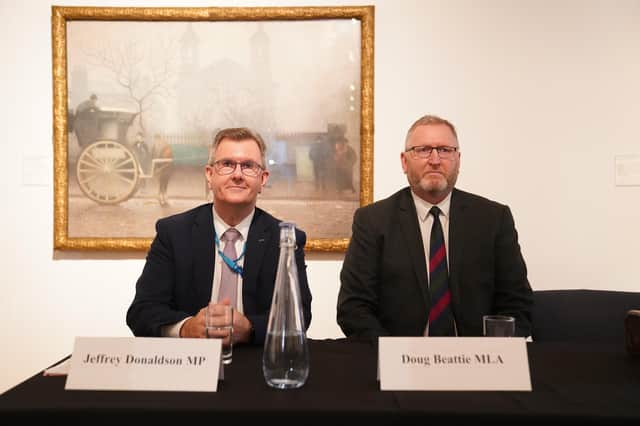Why political unionism needs to stop selling fear and start selling hope, writes Graham Spencer


For Sinn Féin, if NI now becomes more contented, workable and at ease as a place then the case and need for a united Ireland is weakened.
For the DUP, a better, more progressive NI will erode the persistence of fear that the party has exploited for so many years. In the absence of that fear what does the party stand for and what might it become?
Advertisement
Hide AdAdvertisement
Hide AdTo consider here what this challenge means for the DUP one thing is clear and that is the party needs a new narrative with a future focus. It must offer hope and end the enduring sense of loss that keeps unionist communities anxious and worried about what may lay ahead.
Sinn Féin has a future narrative and because of that is seen to be working for hope and change, disagreeable though that may be for many others.
In contrast, the DUP, to date, has no future narrative. And, as the political academic Jonathan White points out ‘those who neglect the future cede important political terrain to others who can use it against them’.
Part of the problem is a reliance on defending a past that is receding into the distance while, at the same time, not having a new destination to work towards. In that instance, the DUP cannot move forward. It is stuck and so cannot effectively articulate movement or progress.
Advertisement
Hide AdAdvertisement
Hide AdThe future has to be conceived as an improvement on the past and the working towards that end means working away from something else.
What is it that the DUP must now work both towards and away from in order to offer a more confident and hopeful NI?
Significantly, the DUP has relied on using the past as a motivating focus for Ulster nationalism and expressed this as a necessary bulwark against any advance by Sinn Féin or the SDLP.
But this outlook means little in the context of a Union that prefers the appeal of liberalism and diversity as a growing reference point for identity.
Advertisement
Hide AdAdvertisement
Hide AdFor those who emphasise the importance of the Union more needs to be done to explore the basis of that relationship and what benefits derive from it.
For sure, the development of a centrist politics is preferable for most compared to absolutism or fundamentalism even taking into account the security that some derive from these positions.
But, the notion of a progressive future sits on the political middle ground of moderation and progression within a broader historical context.
As fresh attempts to question the colonial past and social relations emerge so understanding at first narrows before then opening into a fresh context of understanding where the past broadens.
Advertisement
Hide AdAdvertisement
Hide AdThis is an important initial step for a more forward-looking unionism – to broaden the past and in that new space consider other possibilities for thinking about history, identity and relationships.
To put it another way, the past should be seen not just commemoratively or nostalgically but also in terms of opportunities lost and aspirations denied as a result of the divisive and violent actions of conflict that must now be realised and achieved.
Recent statements from the DUP leadership about the need to be more inclusive and acknowledge the importance of other identities in Northern Ireland are certainly a welcome start.
But this shift also needs to be needs conceived as part of a wider urgency for political reform.
Advertisement
Hide AdAdvertisement
Hide AdConcrete steps such as ending the divisive power-splitting function of the St Andrews Agreement and forging a new basis for sharing power that reengages with the spirit of the GFA and is bolstered by a revitalised Civic Forum, along with monitoring and developing inclusivity as part of the work conducted by a proposed Independent International Commission on Reconciliation, would help.
Unionism could shape its core message on progress from working with business, civic society, the arts and international players to help build creativity, prioritise education and develop employment.
Further, to connect more with the future, the DUP should strongly use the dreams and hopes of young people as a basis for motivation and possibility.
In relation, the party sensibly took the education portfolio. If that portfolio is now driven by a fresh impetus to address segregation in education it will also provide a platform to push forward a new positive agenda for change that is focussed on the future.
Advertisement
Hide AdAdvertisement
Hide AdSince education IS the future the path for change is now open. However, if there is an attempt to impose regressive measures into the education system or to assert a backward-looking ethos then that door will be quickly closed and with it any credible position on inclusion and progression will be lost.
All of this points towards a need for political unionism to become more proactive and less reactive. To recognise that it needs to move from an oppositional ethos to a leadership ethos and that it must broaden its influence by pushing for greater diversity and inclusion in NI as whole.
Ultimately such measures and changes should aim to achieve the overall effect of ending a reliance on fear as the dominant political message and to stop living up to the stereotypes that serve the interests of others.
Until the DUP and political unionism more widely accept the need for radical change they will not be a persuasive force for that change and will continue to act in crisis mode or resort to retrograde steps to try and prevent what they do not like from happening.
Advertisement
Hide AdAdvertisement
Hide AdThose unionists would do well to remember the words of Nelson Mandela: ‘May your choices reflect your hopes, not your fears’.
Graham Spencer is Professor of Social and Political Conflict at the University of Portsmouth